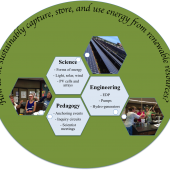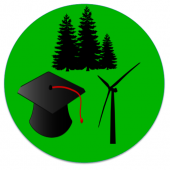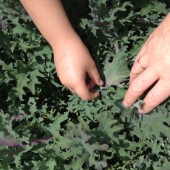
In August 2014, twenty-nine K-8 teachers from eleven Vermont schools engaged in the science, engineering and pedagogical practices of sustainable energy education. This week long workshop was organized by the Vermont Science Initiative (VSI), with an engineering and science instructor each from Norwich University and Lyndon State College respectively, and in partnership with the Vermont Energy Education Program (VEEP).
Teachers defined energy in terms of work, differentiated between transfers and transformations occurring across different energy forms, and gained a deeper conceptual understanding of renewable and nonrenewable energy sources. Opportunities for inquiry ranged from wind turbines, to electrical circuits, to light and Photovoltaic (PV) cells, and an energy bike. These, in combination with scientist meetings and a field trip to a nearby solar PV farm solidified their scientific literacy in the sustainable energy context. The teachers were also led through the Engineering Design Process (EDP) including concepts of design criteria and constraints to learn about sustainably engineering the energy components of systems. Teachers worked in groups to build an Archimedes Screw pump and determined the efficiency of a micro-hydro-generator. By the end of the week, post assessment test results revealed that the teachers had a 37% improvement in understanding various content areas.
By engaging elementary and middle school teachers in fun, hands-on exploration of sustainable energy we hope to bring this form of literacy to our youngest citizens, and future leaders and decision makers. The opportunity to continue engagement throughout the year with three follow-up sessions, and a forum to share the units they developed and best practices through the VT Agency of Education website will serve as a model for other stakeholders interested in implementing a similar program.
Continue Reading
Linking ecology and energy literacy efforts is an essential step for producing scientifically literate citizens who are able to make informed choices about energy, yet the two literacies have developed independently. To explicitly link these, we explored the interface between ecology, energy and education by inviting experts from diverse fields to share perspectives on how to improve public literacy in ecology and energy. This paper presents a synthesis of three organized sessions at the Ecological Society of America (ESA) August 2014 annual meeting: a symposium on a broad range of issues related to energy, ecology and sustainability; an organized oral featuring innovative approaches using ecological concepts to educate Kindergarten through college students about energy, and a share-fair where these innovations were demonstrated. Presentations represented all age-levels, non-formal and formal education, the geophysical sciences, public policy experts, government agencies, ecologists and sociologists, faith-based and environmental non-profits.
Diverse, creative and innovative educational approaches are underway, with major government funding attesting to their import. For ecologists, most of the energy applications centered on sustainability issues, and focused on climate change caused by fossil fuel development. Emerging considerations include direct impacts of energy development and transmission on ecosystems. Conversely, energy literacies should consider the role of ecology, given the ecological impacts involved in decisions about energy extraction and transport. General public audiences including environmental, faith-based and environmental justice communities are increasingly considering environmental dimensions in energy decisions and policy outreach but often on single, time-sensitive issues. Adult education would benefit from a more comprehensive integration of energy and ecology.
We propose that including an explicit ecology dimension in the energy literacies, and similarly involving energy application in the ecology literacies, would be synergistic and allow these inclusive and inherently interdisciplinary fields to flourish and best serve our educational goals of achieving an informed citizenry.
Continue Reading
In order to address the ecological and social problems of sustainability in our modern times, citizens need to be empowered with an understanding of science, technology, engineering, and math (STEM) concepts and practices. Furthermore, STEM must be democratized and taught in life-giving and life-sustaining ways that include all students instead of the small fraction of “high achievers” and limited to the “potential” scientists, engineers, and mathematicians. At present, K-12 students and their teachers rarely have the opportunity to learn beyond their concrete school walls and to reconnect with nature, exacerbating their disconnection of STEM from real life and hence sustainability. We believe that engagement with school grounds and gardens and the very soils on which learning takes place can provide simple yet authentic day-to-day educational experiences that can bring mindfulness of lessons related to the cycles of life and death and to the interplay of justice and power in our communities. To transform teaching and learning in the classroom, teachers need different learning experiences that provide them with the time, space, and appropriate supports to translate their learning into teaching practice making education relevant to life. School gardens provide a rich context for learning both for teachers and students by embracing experiential, integrated, and collaborative learning. This study highlights an example of a summer program that involved teachers in hands-on education related to STEM in the learning gardens at four low-income schools in southeast Portland representing the growing ethnic, linguistic, and cultural diversity of the districts in the metropolitan area. Teacher voices capture the essence of learning STEM in the learning gardens, and also address issues of social and environmental justice.
Continue Reading
PDF: Galeshi Winter2013 Abstract: This literature-based report aims to synthesis and summarize the existing research on female’s (meaning adult women and girls) propensity for enrolling and continuing in the science, technology, engineering, and mathematics (STEM) fields at through university level. To create and maintain a sustainable future, it is essential to support females enroll and […]
Continue Reading